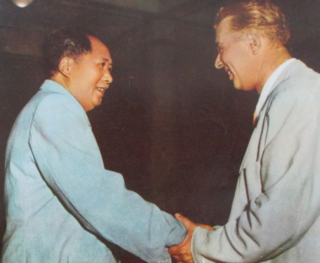
The Sino-Albanian split was the gradual worsening of relations between the People's Socialist Republic of Albania and the People's Republic of China in the period 1972–1978.

Union of Italian Communists (Marxist–Leninist) was a pro-Chinese communist group in Italy. The UCI(m-l) was founded in Rome on 4 October 1968. Its main organ was Servire il popolo. The main leaders of UCI(m-l) were Aldo Brandirali, Enzo Todeschini, Angelo Arvati and Enzo Lo Giudice.
The New Communist movement (NCM) was a diverse left-wing political movement during the 1970s and 1980s in the United States. The NCM were a movement of the New Left that represented a diverse grouping of Marxist–Leninists and Maoists inspired by Cuban, Chinese, and Vietnamese revolutions. This movement emphasized opposition to racism and sexism, solidarity with oppressed peoples of the third-world, and the establishment of socialism by popular revolution. The movement, according to historian and NCM activist Max Elbaum, had an estimated 10,000 cadre members at its peak influence.

The Communist Party of Greece (Marxist–Leninist), is a Maoist communist political party in Greece.

Chilean Communist Party (Proletarian Action) (Spanish: Partido Comunista Chileno (Acción Proletaria), PC(AP)) is an anti-revisionist Marxist–Leninist communist party in Chile, founded in 1979 and originating from the pro-Albanian tradition of the Revolutionary Communist Party. It has presented independent candidates on legislative elections. The General Secretary of PC(AP) is Eduardo Artés.

The International Communist Party (ICP) is the name assumed by a number of left communist international political parties today. The ICP has often been described as Bordigist due to the contributions by longtime member Amadeo Bordiga, although the adherents of the party don't define themselves as Bordigists.
Nagalingam Shanmugathasan was a trade unionist and Maoist revolutionary leader in Sri Lanka. He was the General Secretary of the Ceylon Communist Party (Maoist)
In 1980, an International Conference of Marxist–Leninist Parties and Organisations was organized by communist groups dissatisfied with the new leadership in China after the death of Mao Zedong and the overthrow of the Gang of Four. Participants were:

The Italian Marxist–Leninist Party is a political party in Italy. Founded in Florence on 9 April 1977 as an anti-revisionist Communist party, the leading core of the PMLI began their political activity as they joined the Communist Party of Italy (Marxist–Leninist) in 1967. The group broke away from the PCd'I (ml) in 1969 and formed the Marxist–Leninist Italian Bolshevik Communist Organization. In 1977, the OCBIml was transformed into the PMLI. The party's general secretary is Giovanni Scuderi. Its official newspaper is called Il Bolscevico. During its history, the PMLI did not take part to any national, European, or local election.

Giovanni Scuderi is an Italian politician and general secretary of the Italian Marxist–Leninist Party (PMLI), which was established by him and others on 10 April 1977.
The Communist Party of Fiume was instituted in November 1921, after the proclamation of the Free State of Fiume created by the Treaty of Rapallo. The Communist Party of Fiume was the smallest Communist Party in the world at the time. It was founded following the principles of the Third International, according to which each sovereign State had to have its own Communist Party organization.
The Communist Party (Marxist–Leninist) was a Maoist political party in the United States.
Marxism–Leninism–Maoism (MLM), also known as Marxism–Leninism–Mao Zedong Thought, is a political philosophy that synthesizes and builds upon Marxism–Leninism and Mao Zedong Thought. Marxism–Leninism–Maoism was first formalized by the Shining Path in 1982.
The International Conference of Marxist–Leninist Parties and Organizations (ICMLPO) was an international grouping of political parties and organizations adhering to Mao Zedong Thought founded in 1998 by the Marxist-Leninist Party of Germany. It was organized by a Joint Coordination Group and met every two or three years. It ceased to exist in 2017.

The Communist Party of Italy (Marxist–Leninist) was a political party in Italy. It was at one time Italy's largest Maoist group, until it changed affiliation and sided with Albania.

The Italian Communist Party is a minor communist party in Italy.

The Communist Party of Sri Lanka (Marxist–Leninist) was a political party in Sri Lanka. The party originated in a split in the Ceylon Communist Party, as tension had risen between N. Shanmugathasan and Watson Fernando. On September 22, 1972 the N. Shanmugathasan-led Central Committee of CP(P) declared Fernando and fellow CC members Ariyawansa Gunasekara and V.A. Kandasamy expelled. On November 12, 1972 Fernando's group declared itself as the CPSL(M-L).

The Maximalist Italian Socialist Party or PSIm, was the residual part of the Italian Socialist Party in exile following the split that occurred during the first phases of the Socialist Convention of Grenoble, held on 16 March 1930, by Pietro Nenni and the fusionist fraction.

The CARC Party is an anti-revisionist Marxist–Leninist communist party in Italy. CARC is the acronym of "Comitati di Appoggio alla Resistenza per il Comunismo".

The Communist Party of Italy (Marxist–Leninist) Red Line was a political party in Italy that existed from 1968 to 1977. The group emerged in December 1968 after a split in the Communist Party of Italy (Marxist–Leninist).













